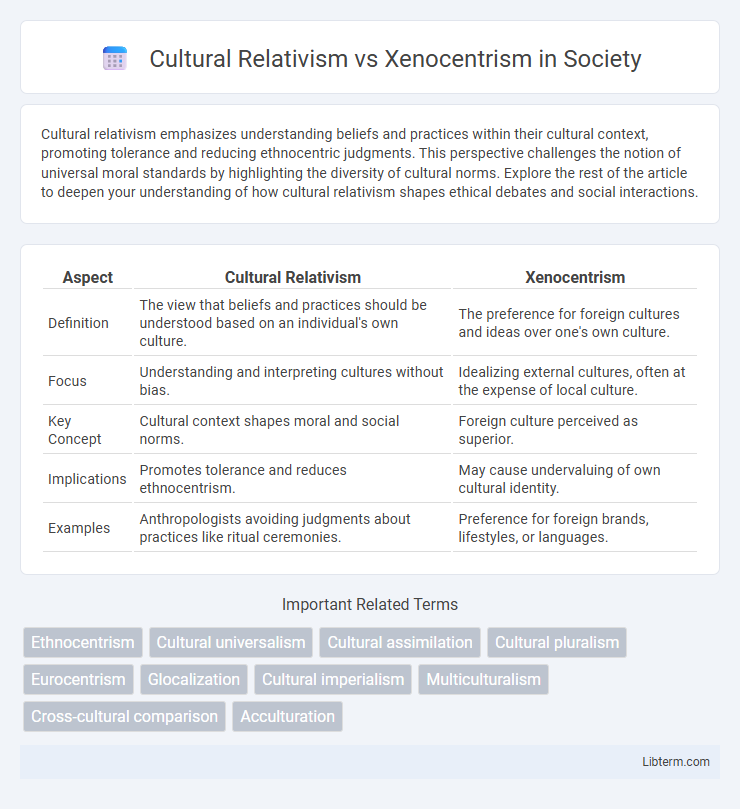Cultural relativism emphasizes understanding beliefs and practices within their cultural context, promoting tolerance and reducing ethnocentric judgments. This perspective challenges the notion of universal moral standards by highlighting the diversity of cultural norms. Explore the rest of the article to deepen your understanding of how cultural relativism shapes ethical debates and social interactions.
Table of Comparison
| Aspect | Cultural Relativism | Xenocentrism |
|---|---|---|
| Definition | The view that beliefs and practices should be understood based on an individual's own culture. | The preference for foreign cultures and ideas over one's own culture. |
| Focus | Understanding and interpreting cultures without bias. | Idealizing external cultures, often at the expense of local culture. |
| Key Concept | Cultural context shapes moral and social norms. | Foreign culture perceived as superior. |
| Implications | Promotes tolerance and reduces ethnocentrism. | May cause undervaluing of own cultural identity. |
| Examples | Anthropologists avoiding judgments about practices like ritual ceremonies. | Preference for foreign brands, lifestyles, or languages. |
Understanding Cultural Relativism: Definition and Principles
Cultural relativism is the principle that an individual's beliefs and activities should be understood by others within the context of that person's own culture, emphasizing the avoidance of ethnocentric judgment. Rooted in anthropological theory, it promotes cultural understanding and tolerance by recognizing the validity of different cultural norms and values without imposing external standards. This concept challenges universal moral frameworks by advocating that cultural practices be evaluated based on cultural-specific criteria rather than external or dominant cultural perspectives.
What is Xenocentrism? Key Features Explained
Xenocentrism is the preference for the cultural practices, products, or values of foreign societies over one's own. Key features include an idealization of foreign cultures, a perception that other cultures are superior, and a tendency to devalue or overlook the intrinsic worth of one's indigenous traditions. This contrasts with cultural relativism, which promotes understanding and evaluating cultures based on their own contexts rather than through external comparisons.
Historical Origins of Cultural Relativism and Xenocentrism
Cultural relativism originated in the early 20th century, primarily through the work of anthropologists like Franz Boas, who emphasized understanding cultures within their own contexts rather than imposing external judgments. Xenocentrism, contrasted with cultural relativism, has roots in socio-cultural dynamics where societies idealize foreign customs or values, often emerging during periods of colonization or globalization. Both concepts reflect evolving perspectives on cultural identity and intercultural relations throughout history.
Cultural Relativism vs Xenocentrism: Conceptual Differences
Cultural relativism emphasizes understanding and evaluating cultural practices within their own social context, promoting tolerance and reducing ethnocentric bias. Xenocentrism, in contrast, involves a preference for foreign cultures over one's own, often leading to undervaluation of domestic traditions. These conceptual differences highlight cultural relativism's goal of cultural appreciation versus xenocentrism's inclination toward idealizing external cultural norms.
Impacts of Cultural Relativism on Social Interactions
Cultural relativism fosters empathy and tolerance by encouraging individuals to evaluate behaviors and beliefs within their specific cultural contexts, reducing ethnocentric judgment. This perspective promotes social cohesion by enabling more respectful and open-minded interactions across diverse cultural groups. However, it can also complicate moral consensus when conflicting cultural norms challenge universal ethical standards.
Effects of Xenocentrism on Cultural Identity
Xenocentrism can significantly impact cultural identity by diminishing individuals' appreciation of their own cultural values, traditions, and achievements in favor of foreign cultures perceived as superior. This shift often leads to cultural disintegration, where community members may undervalue their heritage and adopt external norms, resulting in weakened social cohesion and loss of cultural uniqueness. Such effects contrast with cultural relativism, which promotes understanding and respect for all cultures, supporting the preservation and celebration of one's cultural identity.
Examples of Cultural Relativism in Modern Societies
Cultural relativism manifests in modern societies through practices such as recognizing indigenous healing methods alongside Western medicine in countries like Canada, and incorporating diverse dietary customs in public institutions. Multicultural education programs in schools also exemplify cultural relativism by promoting respect for various linguistic and religious traditions. These examples highlight an understanding that cultural norms and values are context-dependent and should be respected within their own social frameworks.
Real-World Cases Illustrating Xenocentrism
Real-world cases illustrating xenocentrism often involve consumer preferences for foreign products over domestic ones, such as China's demand for European luxury brands despite its growing local market. In developing countries, xenocentrism can manifest in the preference for Western education and healthcare systems, perceived as superior to indigenous alternatives. This phenomenon highlights how societal values and identity may shift, prioritizing external cultural norms and goods, ultimately influencing economic and social behaviors.
Roles in Globalization: Cultural Relativism and Xenocentrism
Cultural relativism promotes understanding and respecting diverse cultural practices, fostering global cooperation by encouraging individuals to view customs within their social contexts. Xenocentrism, on the other hand, privileges foreign cultures over one's own, potentially driving consumer preferences and influencing global market trends by valuing external cultural products and ideals. Both concepts shape globalization by affecting intercultural interactions, trade dynamics, and the exchange of cultural values on an international scale.
Evaluating the Merits and Criticisms of Both Perspectives
Cultural relativism promotes understanding and tolerance by assessing cultural practices within their specific contexts, reducing ethnocentric bias and fostering respect for diversity. However, it faces criticism for potentially excusing harmful practices and undermining universal human rights. Xenocentrism, which idealizes foreign cultures over one's own, encourages open-mindedness and global interconnectedness but risks devaluing local traditions and contributing to cultural identity loss.
Cultural Relativism Infographic

 libterm.com
libterm.com